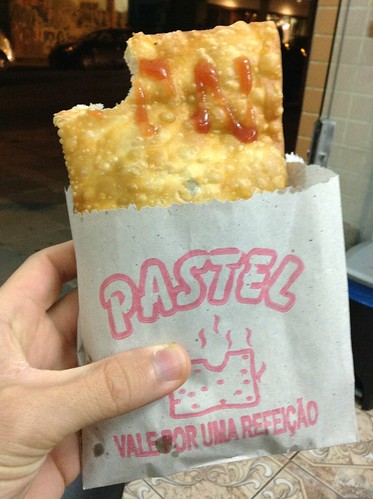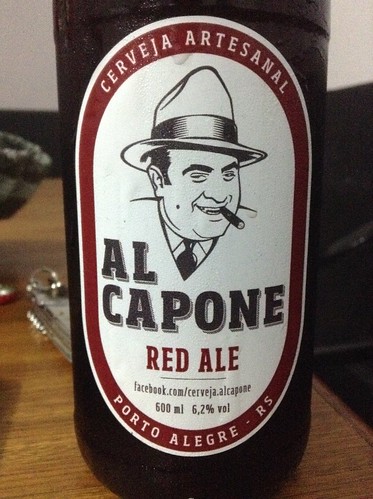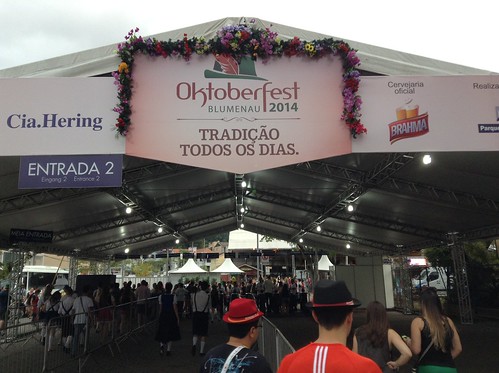
“Stephen!” a muffled voice yelled. I groggily looked up and saw two strange men staring at me as I lay in my underwear. “Stephen!” one of the men exclaimed again. I took out my earplugs and said, “Yeah?”
They said they’d come to take me away.
I pulled on pants and a t-shirt, wondering if the Brazilian government had finally decided to crack down on this foreign journalist working semi-illicitly without a journalist visa. I was sleeping on the living room floor of a complete stranger named Vanessa, who I’d met the previous evening (Oct. 23) at Blumenau’s bus station. The men asked me to take a seat at the kitchen table.
“Vanessa told us you’re a journalist,” one said. “We are her pastors.”
It’s been a bizarre few weeks. I’ve been sleeping in strange places, wandering lost around unfamiliar cities, mixing with Brazilians happily sporting lederhosen and trachtenbluse, and speaking with others devastated by the deaths of 242 youths in a deadly nightclub fire. The oddities seemed to begin when I arrived to Blumenau’s bus terminal without a clue where to go, where to stay, what to do.
I asked directions to the city’s annual Oktoberfest — said to be the world’s third-biggest German beer festival after Munich and Ontario — and two Brazilian hospital workers in light-blue hospital garb told me to hop on the next metro bus with them. We got to chatting and they invited me for a coffee once we got off the bus together. The guy paid. He loved movies, so we talked about movies. Vanessa said she loved Jesus, so we talked about how she had given up beer, smoking, and sex when she converted to Pentecostalism.
Vanessa offered to show me a cheap hotel in the direction of her apartment. We walked there. The hotel seemed a bit overpriced ($40) for the run-down appearance, so she then offered to let me sleep on her couch. I quickly accepted, despite a warning that she had two cats in a messy apartment. I tried to build her confidence in me as an upstanding lad by adding that my dad’s a Baptist minister, which she seemed to appreciate.
I planned to just drop my bag and walk to Oktoberfest, but Vanessa invited me to stay for dinner… three hours later, by now well-acquainted with her two Siamese cats, we sat to eat a homemade bacon-bean stew and squash stir-fry. Vanessa said I could stay as long as needed and gave me a set of keys. It was about 11pm; Oktoberfest could wait. I slept on the floor of the living room, and she went to sleep in her own bed with her two cats.
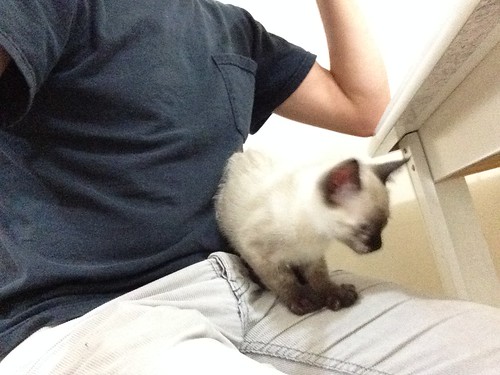
The wrath of the God rattled me awake the next morning. The pastors explained that Vanessa had emailed her church’s head pastor (who was on a mission trip in Israel) to confess she’d allowed a strange man into her apartment; the pastor had called these two assistant pastors in Blumenau with the order to get me out; and the assistant pastors had in turn gone to Vanessa’s hospital, retrieved her house key, and barged into the apartment to restore it to purity.
“But wasn’t Vanessa acting very Christ-like,” I said, “offering a bed to someone without a place to rest?” They agreed that Vanessa had a very kind heart, but they added that their church was like a family and they wouldn’t want strangers in their daughters’ homes. I responded, “It doesn’t seem very Christian for you to now be kicking me out, especially without saying goodbye and thank-you to Vanessa.”
The pastors offered to help me find a hotel, when I remembered that the previous evening I’d received an email from a friend of a friend offering to let me stay with him in Blumenau! The pastors quickly said they’d drive me to that friend’s apartment. I packed and gave Vanessa’s cats a parting scratch.
An hour later, my savior Marcos welcomed me into his apartment on the other side of the city, and soon I was explaining the whole wacky story to him and his boyfriend Osiris. We three sat in the living room passing a clay cup of chimarrão tea, also called mate, which is sipped through a metallic straw with a built-in strainer (and super popular all around the south). When I got to the part about the pastors, Marcos (who says he has a pretty good gaydar system) exclaimed, “Nossa! I thought they were your gay friends! I saw them and right away I was sure they were gay. Com certa!”
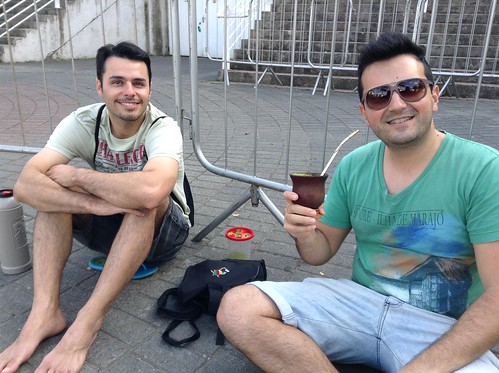
Then I went for a jog and got lost for two hours.
Welcome to Blumenau. Oktoberfest itself turned out to be overwhelmingly underwhelming. Seeing tens of thousands of Brazilians in funny German outfits was amusing, but I was also bombarded with terrible polka music in which every song’s chorus seemed to be “chope! chope! chope!” (beer, beer, beer). And given the mild-tasting beer and overpriced food, I wouldn’t even need to join Vanessa’s church to no longer want to attend.
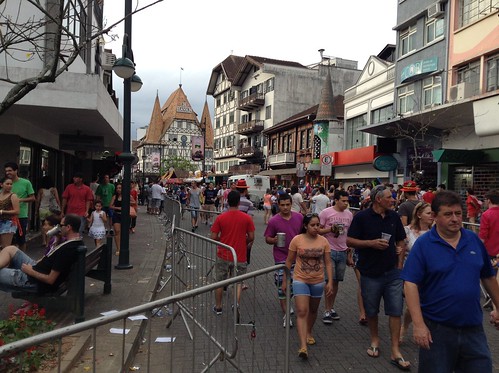
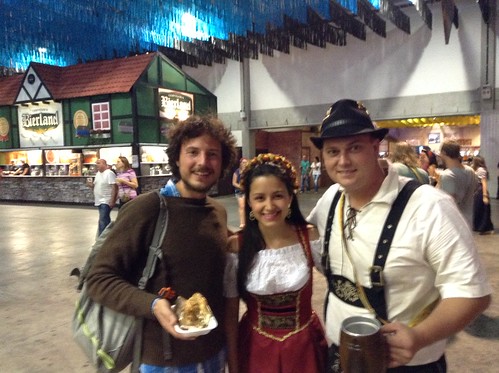
Best of all in Blumenau was just spending time with Marcos and Osiris, a very warm and adorable pair. We walked in the park and shopped in the mall. Osiris, a local newspaper reporter, helped translate for some of my election reporting. Marcos, an OB/GYN assistant, helped teach me a little more Portuguese. We popped popcorn and watched The Walking Dead.
Marcos and Osiris introduced me to an amazing German sandwich shop called Panificio Benkendorf (pictured below), which served a “pao com bolinho” stuffed with beef, tomato, lettuce, pickles, corn, peas, oozy cheese, and zippy tarter sauce.
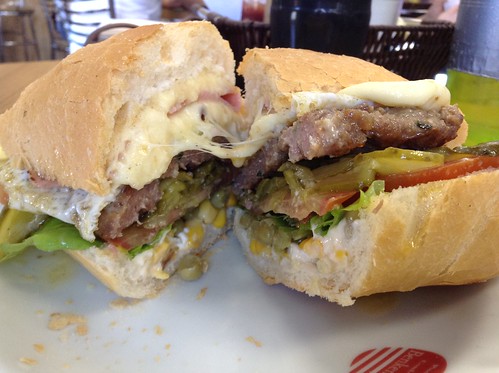
They also connected me to their friend Luísa in the southern capital Porto Alegre, who welcomed me into her city after a sleepless overnight bus and three-mile walk to her apartment — I packed light for this five-month reporting trip, but still my backpack was still feeling heavy those final blocks, and no doubt I smelled less than fresh when I knocked on her door at 8:30am. Still, this friend of a friend of a friend invited me to sit for breakfast and gave me her extra set of apartment keys.
That evening Luísa introduced me to an awesome burger joint (pictured below), and then to met her mother and aunt who were staying in an apartment next door. Both older women gave me a hug, a kiss, and expressed the utmost concern for my sleeping situation, fussing over my bed and cranking up the air-conditioning for me. Give me good-old Brazilian hospitality over evangelical prudishness any day.

Luísa is reporter for top state daily newspaper Zero Hora, and she introduced me to a few journalists who covered a deadly nightclub fire in January 2013 that killed 242 kids in the nearby city of Santa Maria. They briefed me on the latest developments of Santa Maria’s slow-moving court trial against the nightclub owners and the band members who started the blaze during an illegal pyrotechnics show.
Then I took a four-hour bus to Santa Maria to speak myself with some of the victims’ families, including Adherbal Ferreira, whose 22-year-old daughter died in the nightclub fire. Adherbal and I visited the site of the nightclub fire, and at his suggestion the next day I visited the city cemetery where his daughter and many other victims are buried. He said that many families would be visiting the victims’ graves on on All Soul’s Day (November 2). This was some of the most uncomfortable reporting I’ve done in a while.
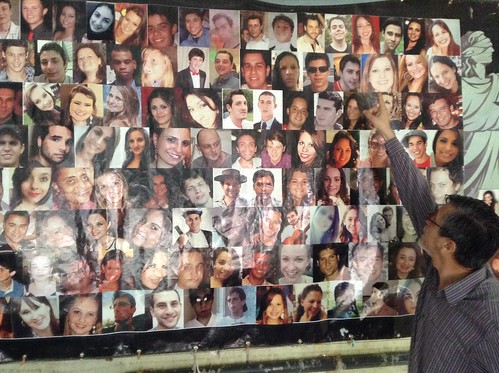
It was overcast and drizzling when the taxi dropped me at the cemetery gates, and I was reminded of visiting the old Gothic cemeteries of Budapest on All Soul’s Day a decade ago as a college student, seeing thousands of people visiting the graves of ancestors and old state heroes in a carnival-like family atmosphere of picnics and food carts. But this was much more somber, much smaller. I wandered around the cemetery alone, soon finding a row of graves for the college kids who had all died on Jan. 27, 2013.
After an hour a young man arrived and crouched by one of the graves. I approached and stood nearby while he stared at the tombstone. After a few minutes I asked if he knew the deceased. He said it was his sister.
“My mother and I arranged her grave,” he said. “I come here constantly, but today is a holiday in Brazil and I decided to come by today again. She was very young, she was in a really good phase of her life…and it was interrupted unexpectedly
“I want justice at the very least for this to not occur again,” he continued. “Because in the future, I could have a child, a grandchild, and if today we don’t take this seriously, other events could occur in the future. So, I think that justice is necessary. Not only because people lost their lives, but because other people could lose their lives in the future.”
Then he complimented the stylish design of my very slim iPod, which I was using to record the conversation.
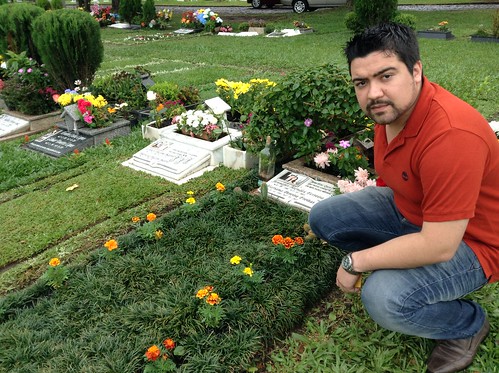
Depressing as that whole story was to report, it wasn’t hard to leave Santa Maria the next day and return to the “happy port” of Porto Alegre, where I’m continuing my very strenuous research into southern Brazil’s emerging craft beer scene.
